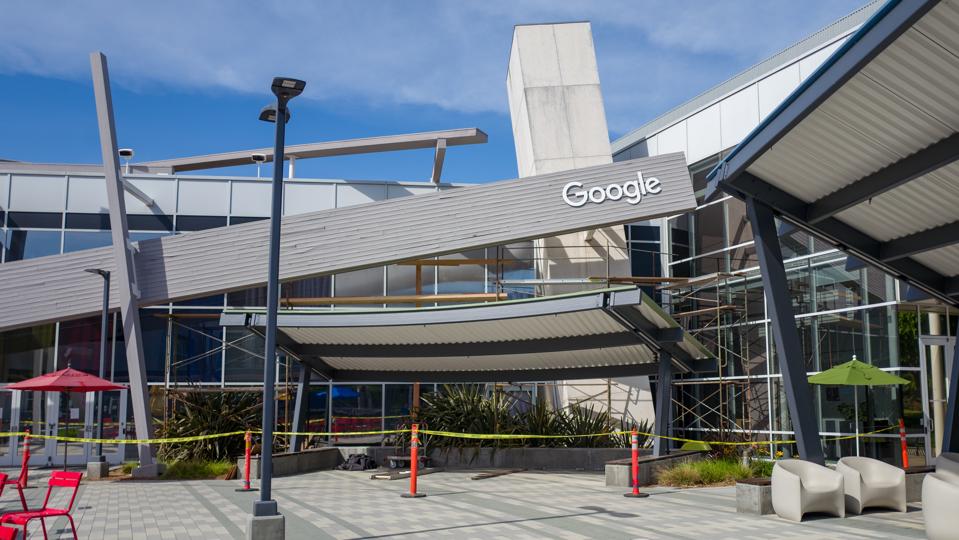
Facade with logo at the Googleplex, headquarters of Google Inc in the Silicon Valley, Mountain View, ... [+]
Getty ImagesThe Googleplex set a new standard for offices: famed for their dining rooms, open-plan common areas, facilities for employees and perks that were previously unimaginable: table football, laundries, pet care and even masseurs.
In an interview with Time, Google and Alphabet CEO Sundar Pichai reveals that what the company is considering now, after lockdown, is a hybrid approach, which means that workers can choose at any time in a completely flexible way if they want to work from home, or if they prefer to come to the office for face-to-face meetings, and to use certain services.
Surveys carried out by the company reveal that 62% of the company’s workers want to return to the offices at some point, but not every day, and instead flexibly and voluntarily. Google says work will be distributed at least until mid-2021 for safety reasons, and that it is also remodeling its offices along onsite lines, allowing for meetings or events planned by the workforce, which should be able to accommodate a wide variety of formats and multiple requirements. The idea is that employees work comfortably and flexibly, with points of contact that make it possible not only to maintain the corporate culture and to see each other’s faces when necessary, along with an ideal of excellence and access to the resources required for any type of task.
For a company that has invested as much in its physical offices as Google, its willingness to alter its operations for the sake of greater flexibility is encouraging. At the same time as employees will be able claim up to $1,000 toward additional monitors, cameras, chairs or other types of furniture at home, the company is opening new offices in more cities, meaning that even those employees who mainly work from home will know there is a central hub where they can connect with colleagues.
In 2017, a company that until then had encouraged remote working, IBM, announced a change of policy and began forcing employees to return to the office. The move followed Marissa Mayer’s decision in 2013, when the newly appointed Yahoo! CEO published an internal memo, “Physically Together,” laying out her plan to bring workers together in a bid to save the company by reinforcing a corporate culture that had been lost — a strategy that many of us saw as outdated and that failed. As I said at the time, there are changes that cannot be reversed, and incorporating flexibility and freedom of decision and movement for workers is one of them.
Now, several years and a pandemic later, we are beginning to realize that the solution is not simply sending workers home, but instead to offer them the freedom to work where and how they see fit, providing them with the resources to do so. If you decide to stay at home, you must not only have the right kit to do so efficiently and safely, but also the space. If you decide to go to the office for whatever reason, because you want to have a face-to-face meeting, have an after-work beer with your colleagues, meet a client in an environment that ensures adequate representation or mount an event, your company must ensure not only that you can do it, but also that you can plan and carry it out.
Companies will now find themselves having to provide adequate infrastructure and services for their employees if they want to attract and retain talent. Freedom, trust and providing the right resources will be the factors that give a company an approach that is attractive, that will make the workforce feel truly privileged, that will make people with the most suitable profile crazy about the idea of working in that company and under those conditions. It will also imply a more flexible approach to people management: employees’ needs vary enormously, particularly over the years, and companies will now have to be more sensitive toward accommodating them. This new approach to human resources, which no longer sees people as “a resource” but rather as people with whom a relationship of trust is maintained, which must necessarily be mutually satisfactory, will surely be the key to the future.
And if that means that you have to remodel your strategy and even some very expensive offices brimful of state-of-the-art services that were once the envy of your competitors… then you’ll just have to get on with it.
The Link LonkSeptember 26, 2020 at 04:56PM
https://ift.tt/308QmBd
Hybrid Work: We All Know It Makes Sense - Forbes
https://ift.tt/2VuKK1x
Work

No comments:
Post a Comment